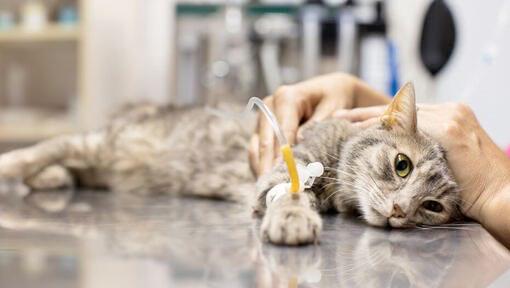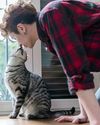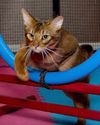Prøve GULL - Gratis
Premature Enzyme Activation Pancreatitis in Cats
Cat Talk
|February 2024
Has your cat ever had repeated or continuous episodes of diarrhea or vomiting? Maybe your vet has given you medication and the issue seemed to go away for a while but then came back.

Does your cat seemed to be on the thin side even after a spay or neuter when they should have put on the feline equivalent of “the freshman 15?” The reason could be a condition known as pancreatitis.
What is Pancreatitis?
The pancreas is a vital organ, located on the right side of the abdomen next to the stomach. Pancreatitis occurs when this organ becomes inflamed. While weighing only about six to eight ounces,1
it consists of two separate parts that serve two very different vital functions for maintaining a cat’s health. The first part, the endocrine pancreas, produces various hormones. Two of the main hormones produced by the pancreas are glucagon and insulin, which regulate blood sugar levels.1 The second part, the exocrine pancreas, produces enzymes which are delivered to the intestinal tract to aid in the digestion of fats, proteins, and carbohydrates. If these enzymes become activated prematurely, they can seep into the pancreas and surrounding tissue, causing damage and inflammation.1 Cats can develop issues specific to each part of the pancreas. Diabetes mellitus is a common disorder of the endocrine pancreas, while exocrine pancreas can be affected by pancreatitis.
Inflammation of the liver and intestines may also be seen with pancreatitis. This multi-organ inflammation is sometimes referred to as ‘triaditis’. This occurs because the inflammation associated with acute pancreatitis allows digestive enzymes to spill into the abdominal cavity.2 Pancreatitis is not breed specific nor is it related to the age or sex of a cat.
Denne historien er fra February 2024-utgaven av Cat Talk.
Abonner på Magzter GOLD for å få tilgang til tusenvis av kuraterte premiumhistorier og over 9000 magasiner og aviser.
Allerede abonnent? Logg på
FLERE HISTORIER FRA Cat Talk

Cat Talk
Holiday Aromatics
Are They Naughty or Nice?
3 mins
December 2024

Cat Talk
Feline Photographers Part 2
Social media is rife with pictures of our pets, especially cats.
11 mins
December 2024

Cat Talk
Celebrating the Season With Our Cats
As this writer began work on this project to find holiday stories involving cats, she was amazed to find that there are ELEVEN religious holidays celebrated during December!
4 mins
December 2024

Cat Talk
How Cats Find Their Owners
A month after losing her beloved senior cat, a woman named Amin Diane was parked on a street at night, waiting for her friend.
5 mins
December 2024

Cat Talk
Remembering Willa Hawke
Retired CFA Judge Emeritus Willa Hawke passed away August 2, 2024 in Lake Kiowa, TX at the age of 88. She had been a judge for over 50 years before her retirement in 2016.
1 mins
December 2024

Cat Talk
UP CLOSE AND Purr-sonal
Thoughtful... Caring ... Giving ...Helpful... Committed.
4 mins
December 2024

Cat Talk
DON'T PUFF AROUND PUFF!
THE EFFECT OF SECONDHAND SMOKE ON CATS
5 mins
December 2024

Cat Talk
Fluffy Coats
AND HOW TO CARE FOR THEM
7 mins
December 2024

Cat Talk
Feline Agility?
I Thought Agility Was For Dogs!
7 mins
December 2024

Cat Talk
Come Fly With Me!
TIPS ON NAVIGATING AIRPORT SECURITY WITH YOUR CAT
4 mins
December 2024
Listen
Translate
Change font size

